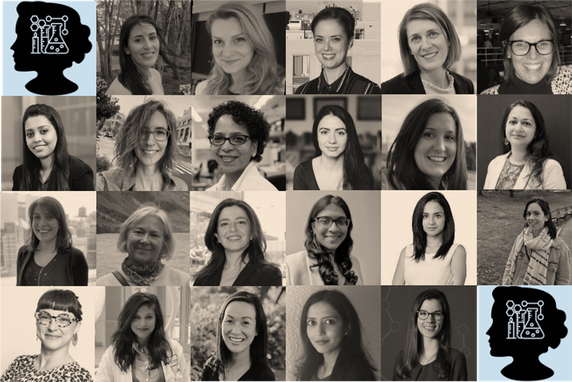|
Words by: Dr Rebecca Caeser Edited by: Dr Lucie Yammine, Dr Vacha Patel and Dr Rinki Saha Women in science have long gone underappreciated. INet-NYC did our part to redress this by hosting a Women in Science month. We featured a female scientist’s story and thoughts on our blog and social media (twitter and instagram) every day for the month of March. We hope many of you walked away from it feeling inspired, relieved that things are changing already, yet still driven for more change. Here are three themes that stuck with us: Motivation One of the themes that ran through all of our interviews was our interviewees love of science. Dr Bhama Ramkhelawon (NYU Langone) spoke for many when she said that her motivation comes from performing “an experiment to address a question - and it works. Feels fantastic. Feels like the first bite of ice cream on a hot summer day”. Many also mentioned that their motivation is driven by a sense of doing something meaningful which is often fuelled by speaking to patients and/or their families. But several argued that doing great science is not enough to progress equality. Dr Linda Molla (Regeneron Pharmaceuticals) believes that we need to shift our thinking about how leaders within science are rewarded. Currently, individual successes are recorded, but we need to put more focus on “how they manage and help employees or trainees to develop to achieve their goals”. These efforts will be vital to achieving greater gender equity, and are often currently unrecognised. As Dr Molla says, addressing “ineffective management practices would overall create healthier academic lab environments and help retain women in science.” Several interviewees advised focusing on your productivity, rather than how many hours you put into a project. Dr Federica Valsecchi argued that "Being “workaholic” does not always mean being productive." A similar sentiment was shared by Dr Sandra Franco Iborra (New York Genome Center) who said that “one of the most dangerous rules is that you can’t have a work-life balance if you want to be a successful scientist”. We ought to let go of feeling guilty when not working 24/7. And Dr Itziar Irurzun Arana (AstraZeneca) had some good advice for staying motivated through adversity: “don’t be afraid of making the wrong choice, making mistakes is part of the path”. Family It’s no secret that women often feel a pressure to choose between starting a family and progressing their career. Dr Gayathri Srinivasan (Emory University) feels that “the roadblocks for women are that the biological clock and the tenure clock or climbing the corporate ladder are exactly at the same time. This makes for hard choices.” Yet, women should not feel like it’s either all science or nothing. Dr Elisa Venturini (Natera) gave some food for thought on this topic: “Mentors and colleagues who value our expertise will not make us choose. Finding that environment will not be easy, but we should not give up our dreams of starting a family, but rather we should focus on finding that workplace where we are valued even more because we have a family”. Our interviewees had some good tips on how to achieve a healthy work-life balance. In prioritising her work, Dr Lilian Lamech (Chemeleon) said “I often re-evaluate based on the needs of the coming weeks and make sure the goals are manageable. It’s also okay to say no." And as Dr Thu Huynh (Midwestern University) told us, “work-life balance means setting boundaries.” But they also argued for deeper structural changes, such as implementing better paternity and maternity leave, allowing for flexible work hours and affordable daycare for all. As Dr Hannah Meyer (Cold Spring Harbor) argues, women can’t fix equality on their own: “the burden of trying to make a change is often placed on the minority group, here women – this takes away from time that can be spent on research.” Visibility
One of the key obstacles to equality in science identified by our interviewees was visibility. Dr Karuna Ganesh (MSK) points out that “girls are steered away from STEM early on.” This lack of role models is damaging and leads to a shortage of women higher up the scientific career ladder. But role models don’t necessarily have to be celebrity scientists. As Dr Linda Molla (Regeneron Pharmaceuticals) said “If we want to impact change, each and every one of us needs to speak up in our workplaces”. Dr Gayathri Srinivasan (Emory University) agrees: “we will all have to come together as a society to improve women’s visibility in science”. Many suggested that we need equal representation and provide opportunities for junior/early career scientists. But to achieve this, there was a general consensus: we need male allies! Dr Alicia Perez Porro (CREAF) argues that “we need men to step down from manels, from all-men selection committees etc, and to fight with us for equal salaries, equal career opportunities, to take an active role for diversity and inclusion in STEM”. Lastly, a general advice that many would have given themselves if they were starting their career today was to look for mentors early on in their career! As Dr Triparna Sen (MSK) argued “The right mentor will guide you to seize opportunities, open doors for you, will be a sounding board as you make difficult career choices and will champion for you”. To dive deeper into all our female scientist life stories and thoughts on this topic, check out full interviews on our blog and also youtube channel!
0 Comments
Your comment will be posted after it is approved.
Leave a Reply. |
Archives
November 2024
Categories
All
|

 RSS Feed
RSS Feed